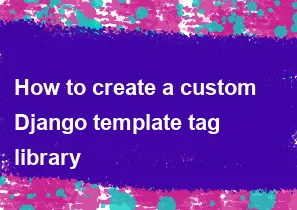How to create a custom Django template tag library

Creating a custom template tag library in Django allows you to extend the functionality of Django's template engine by adding your own custom tags. Here's a step-by-step guide on how to create a custom Django template tag library:
Create a Django App: If you don't have a Django app yet, create one using the following command:
bashpython manage.py startapp yourappnameReplace
yourappnamewith the desired name of your app.Create a
templatetagsDirectory: Inside your app directory, create a folder namedtemplatetags. This folder will contain your custom template tags.Create an
__init__.pyFile: Inside thetemplatetagsfolder, create an empty__init__.pyfile to make the folder a Python package.Write Your Custom Template Tag: In the
templatetagsfolder, create a Python file (e.g.,custom_tags.py) to define your custom template tags. Here's an example:pythonfrom django import template register = template.Library() @register.simple_tag def custom_tag(value): # Your custom tag logic here return f"Processed value: {value}"In this example, a simple template tag named
custom_tagis defined. You can replace the logic inside the tag with your custom functionality.Load Your Template Tags in Templates: In the templates where you want to use your custom tags, load them using the
{% load %}tag at the top of the template file:html{% load custom_tags %}Use Your Custom Template Tags: Now, you can use your custom template tags in the template:
html{% custom_tag some_variable %}Replace
some_variablewith the variable or value you want to pass to your custom tag.Configure Your App in Settings: Make sure that your app is included in the
INSTALLED_APPSsection of your project'ssettings.pyfile:pythonINSTALLED_APPS = [ # ... 'yourappname', # ... ]Run Your Django Development Server: Start your Django development server using the following command:
bashpython manage.py runserverVisit your template that uses the custom tag in a web browser, and you should see the output of your custom template tag.
That's it! You've created a custom Django template tag library. You can define more complex template tags, including custom filters and inclusion tags, based on your specific needs.
-
Popular Post
- How to optimize for Google's About This Result feature for local businesses
- How to implement multi-language support in an Express.js application
- How to handle and optimize for changes in mobile search behavior
- How to handle CORS in a Node.js application
- How to use Vue.js with a UI framework (e.g., Vuetify, Element UI)
- How to configure Laravel Telescope for monitoring and profiling API requests
- How to create a command-line tool using the Commander.js library in Node.js
- How to implement code splitting in a React.js application
- How to use the AWS SDK for Node.js to interact with various AWS services
- How to use the Node.js Stream API for efficient data processing
- How to implement a cookie parser middleware in Node.js
- How to implement WebSockets for real-time communication in React
-
Latest Post
- How to implement a dynamic form with dynamic field styling based on user input in Next.js
- How to create a custom hook for handling user interactions with the browser's device motion in Next.js
- How to create a custom hook for handling user interactions with the browser's battery status in Next.js
- How to implement a dynamic form with dynamic field visibility based on user input in Next.js
- How to implement a dynamic form with real-time collaboration features in Next.js
- How to create a custom hook for handling user interactions with the browser's media devices in Next.js
- How to use the useSWRInfinite hook for paginating data with a custom loading indicator in Next.js
- How to create a custom hook for handling user interactions with the browser's network status in Next.js
- How to create a custom hook for handling user interactions with the browser's location in Next.js
- How to implement a dynamic form with multi-language support in Next.js
- How to create a custom hook for handling user interactions with the browser's ambient light sensor in Next.js
- How to use the useHover hook for creating interactive image zoom effects in Next.js